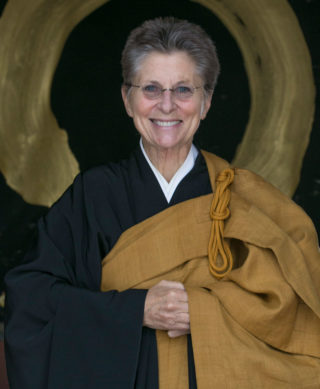COMPASSION AT THE EDGE BY ROSHI JOAN HALIFAX
 Enjoy this excerpt from At the Edge, Roshi Joan’s new book, to be published May, 2018.
Enjoy this excerpt from At the Edge, Roshi Joan’s new book, to be published May, 2018.
When we’re at the edge, in danger of falling over the precipice into suffering, compassion is the most powerful means I know for keeping our feet firmly planted on the earth and our heart wide open. When I have contemplated the systemic violence of war, racism, sexism, and environmental degradation, compassion has protected me from getting mired in chronic moral outrage. During my years of volunteering in a maximum security prison, compassion kept me from burning out. Compassion has been my greatest ally during the hardest of times, and is a win-win situation. Not only has my life been strengthened by compassion, but those whom I have served may have benefited as well.
I have also been the recipient of compassion; my life has been profoundly affected by times when others have shown me great kindness. Many years ago, I was lying on a hospital bed, waiting for surgery, shivering with fear. A Buddhist friend sat with me. As the team arrived to take me into the operating room, my friend squeezed my hand and with a steady gaze said, “Remember who you really are.” His touch, his words sent a wave of relief through me, and I dropped into a place that was larger than my dread of surgery, vaster than my fear of death. As I was wheeled down the hall, words spoken by the late Roshi Hakuun Yasutani flashed across my mind: “The compassion of the undifferentiated body of no-cause comes burning forth.”
When, like my friend, we offer compassion, it burns forth from our heart like a comet. This is the spirit of Avalokiteshvara, the bodhisattva of compassion, who hears the cries of the world and responds with a boundless heart—one that does not sink like a heavy stone in the waters of suffering, but that is broken open like a geode to the rare space within, glittering with light for those who are struggling in darkness.
For decades I have traveled the geographies of compassion, exploring its structure and the deeper processes at play in this powerful landscape. I have examined scientific studies on compassion, received teachings from Buddhist adepts, shared stories with caregivers, sat with prisoners and dying people, trained educators and business people in approaches to compassion, and used my meditation practice as a medium of investigation. And then there are the challenges that life has given me—the perils that have also been ripe with possibility.
According to neuroscientist Tania Singer and her colleagues, compassion is defined as “the emotion one experiences when feeling concern for another’s suffering and desiring to enhance that person’s welfare[KB1] .” Compassion also gives us the resilience to bend and balance when we are caught in the winds of change. It helps us meet our own suffering, and that of others, with an appropriate response. I have also discovered that compassion is the path out of the toxic aspects of the other edge states: pathological altruism, empathic distress, moral suffering, disrespect, and burnout. Why? Because compassion calls forth our best human capacities—attentional balance and caring, unselfish intention and insight, and ethical action—in a way that no other response does.
Rev. Joan Jiko Halifax
Founder and Abbot, Upaya Zen Center
[KB1]Leiberg, Klimecki, & Singer, 2011
Read more from Roshi Joan’s upcoming book, At the Edge.







Follow Us!